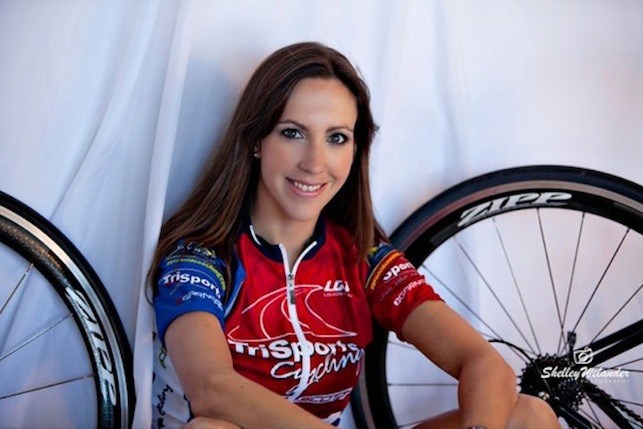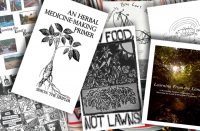Reading the book As Good As Gold, I was struck by the incredible resilience of author and professional cyclist Kathryn Bertine as she attempted to make it to the Beijing Olympics facing issues ranging from flat tires to jellyfish. Perhaps most impressive were the creative solutions she found to these roadblocks.
Reading the book As Good As Gold, I was struck by the incredible resilience of author and professional cyclist Kathryn Bertine as she attempted to make it to the Beijing Olympics facing issues ranging from flat tires to jellyfish. Perhaps most impressive were the creative solutions she found to these roadblocks. A\J’s latest issue, LifeCycles, tackles some huge issues in the environmental world such as climate change and greenhouse gases, and I believe that conversations with those beyond the inner environmental circle can inspire creative new ideas in our efforts to address these issues and create a more sustainable Canada.
I caught up with Kathryn, despite her busy training schedule, to discuss her upcoming documentary, illegal doping and how overcoming adversity has universal solutions such as humour, balance and a little bit of help from the other team.
Jessica Kuepfer: You have been working very hard at a documentary on women’s cycling; can you give us a bit of background on that?
Kathryn Bertine: Well, the documentary was born out of the realization that there is a discrepancy between men’s and women’s cycling such as fewer opportunities to race, shorter distances and smaller prize purses; this did not sit well with me. As I talked to other female athletes, I found I was not alone in this and it was born out of a desire to celebrate the love of sport as well as shedding some light on the obstacles that women face. Many athletes feel as if the cycling federation is not trying to create a situation of equality; there is no structure in place right now for women’s cycling to offer a sustainable career. There are maybe 5 pro teams in the entire world that allow full salary that women can live on without supplementing their salary. In many other sports, there is a structure in place that ensures they succeed and all they need work on is their skill and talent in order to go far in the sport.
JK: There is a stigma with professional sports that causes people to think athletes are receiving multi-million dollar contracts. Does this affect your efforts to create equality in male and female cycling?
KB: Absolutely, and we are not saying that we need huge contracts – we are just saying that if the men are getting them and the females are not, then we need to focus on equality. It is a catch-22 of the word professional in cycling. We don’t need a lot of money, but we should be able to live off the income we make while competing at a professional level. One of the women I am interviewing for the documentary was a national champion from 2011 and has a whole separate business so she can make ends meet. I am not trying to steer the documentary toward the cycling community, but rather have it reach the audience that can relate to it in the way that they know how it is to feel unequal in some way; an audience who questions how we fix it and creates a change.
JK: Speaking of change, do you have anything to say about the recent Lance Armstrong situation? I love the focus in your book on the solutions rather than the problems.
KB: I do not think doping alone is the problem, but rather the flaws in the system that allow that behavior to exist. There will always be cheating in sports, but if coaches, teammates and friends are looking the other way and allowing it to happen, that is where the biggest problem lies. Each federation needs to take a stance and say that they will not go to bat for the athlete if they cheat.
The women’s cycling community does not spend much time on the doping scandals because any time spent focusing on the issue is taking away from celebrating an athlete that is clean. Propagating the problem makes it worse.
If there is a silver lining in the situation, it is that more people are aware of the problem and are primed to focus on a solution. The root of doping is money and corruption and in order to change it, we need an entire overhaul of the system. I think the best way to deal with it is to reference the problem quickly and then focus on the solution; focus on what is being done and not on what has been done.
JK: In our latest issue, we talk about life cycles and how everything is related to everything else. How do you feel that your early career as a figure skater and your experience in sports like handball, pentathlon and rowing relate to your journey now?
KB: I am both a writer and an athlete and both sides entwine to bring about the passion of what I am working on at a certain time in my life. My first book on my career as a figure skater, my latest book on my quest for the Olympics and my future book on the professional cycling world have all morphed into each other; the passion that I had in the early years as a skater has stayed the same, but has shape-shifted into different sports or outlets. For me, it is about maintaining your passion as you continue to grow.
JK: What is the connection between athletics and the environment for you?
KB: As a cyclist, I’m involved in a sport that takes place outside and has a direct connection with the environment. It is so important for an athlete to be aware of their duty to the environment. Most athletes understand this connection, but now and then I see someone litter an energy bar wrapper mid-ride. It doesn’t happen often, but when it does I have no problem verbally educating this rider on my true feelings as to where that wrapper should be shoved. But on a bigger scale, I think cyclists are very aware and interested in keeping a healthy environment in the forefront of their thoughts. After all, it’s a gift to be able to race a bike outside all over the world, and we’re all pretty passionate about keeping our world as sustainable and beautiful as possible.
JK: Your book is hilarious, yet you deal with huge challenges and issues. In your mind, what role does humour take in finding solutions to issues for you?
KB: Although we all have different styles and senses of humour, it is one of the greatest ways to connect universally to each other. Most of the humour in my book is self-deprecation and poking fun at myself rather than others. It is vital to look at the errors and mistakes you make as a human and learn to laugh at that; it is an incredible way to connect with people because everyone can relate. We can learn a lot from it if we can put ourselves out there in some way. Humour is most effective when it is tied to a message because there is a direct link between humour and self-education and self-growth. I am not saying that dark moments are to be made light of, but balance is necessary and humour is essential.
JK: What is your most memorable race moment?
KB: I am looking back on 6 years of cycling now, but a moment that stands out for me was being in a race in South America and I was shooting for my Olympic Points and I was trying to start a break away group which is incredibly hard to do when everyone else has the same idea. I was fading and I felt a hand on my back and a rider from another team gave me a push as if to say: “I see what you are trying to do, don’t give up, keep going.” There was something in that unspoken moment where your competition is reaching out and giving you a push, which is extremely hard in cycling. She was probably half my size and weight, raced for a different country and pro team and yet she saw what I was trying to do and wanted to help.
That moment exposes the beauty of struggle, despite how vicious and cutthroat it can be, that we can all respect each other as we strive to meet our goals and symbolizes the larger picture. We need other people.
JK: What is next on your race calendar?
KB: Most cyclists are off from November to January so the next event on my list is The Tour of Costa Rica and I am going to lead a bike tour in Costa Rica beforehand on February 13 – 19 (www.bikecr.com). I am so excited because bikers of any ability can join. It is going to be a wonderful time.
Jessica Kuepfer is the Advertising and Outreach Liaison at A\J, and a fresh graduate from the University of Waterloo with an English major and French minor. Off duty, she is reading, outside training for her next marathon, or sharing her experiences on her personal blog.
Jessica is A\J's Advertising and Outreach Liaison, and a recent graduate from the University of Waterloo with an English major and French minor. She's also a fitness instructor, marathon runner and volunteer with Greening Sacred Spaces.













